Vampires, Frozen Worlds, and Gambling With the Devil: The Best of Fritz Leiber
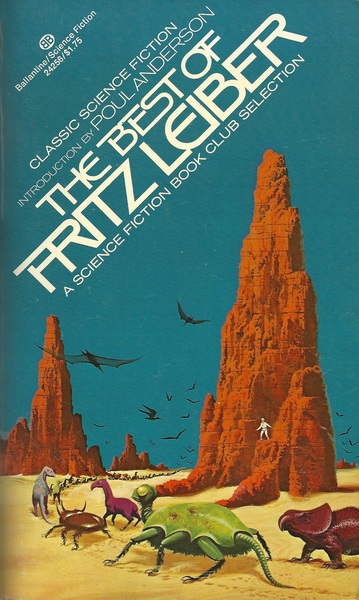 |
 |
In my last post I reviewed The Best of Stanley Weinbaum, the first volume in Del Rey’s Classic Science Fiction Series. In this one I’ll review the second in the series, The Best of Fritz Leiber (1974). The introduction was done by the excellent sci-fi/fantasy author Poul Anderson (1926-2001). The cover was by Dean Ellis (1920-2009), though a later 1979 printing (see below) has a cover by Michael Herring (1947-).
Fritz Leiber is probably best known for his Fafhrd and Grey Mouser sword and sorcery tales. At least, that was my introduction to him. He also produced some of the most well-loved horror tales of the twentieth century, such as “Smoke Ghost” and “The Girl with the Hungry Eyes.” I’ve read some of his science fiction in The Book of Fritz Leiber (Daw, 1974) and Fritz Leiber: Selected Stories (Night Shade Books, 2011), edited by Jonathan Strahan and Charles N. Brown. But it was interesting to read a book dedicated completely to Leiber’s science fiction (though there are one or two stories that I’m not sure fit this moniker).
[Click the images for bigger versions.]
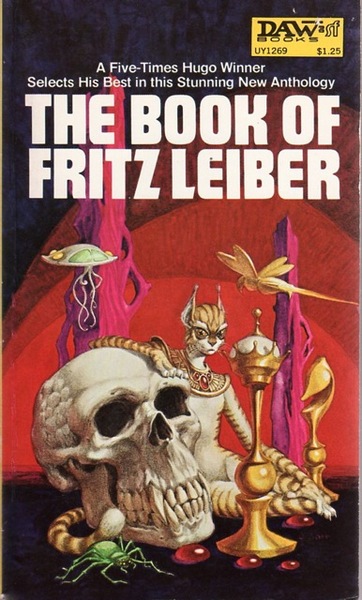 |
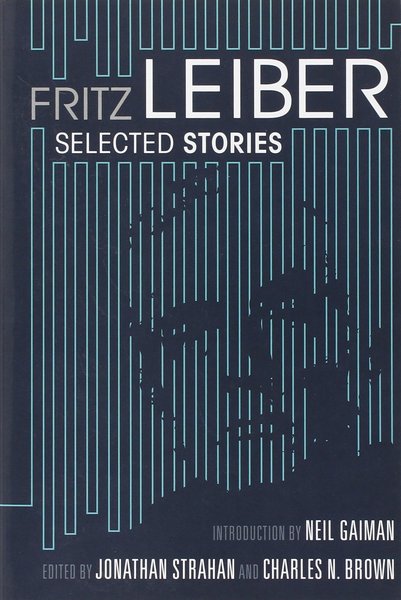 |
I doubt that Del Rey could have selected a second author in this series so strikingly different from Stanley Weinbaum. Whereas Weinbaum was a fun, pulpy story-teller, Fritz Leiber (1910-1992) was a sheer wordsmith, something akin to a sci-fi Shakespeare.
Sometimes when I read fiction (or anything for that matter) I can sort of tune out — not the best reading habit. But usually I can tune back in, and though I may have cognitively missed a paragraph or two, I can still usually follow what’s happening. Not the case with Fritz Leiber. If you tune out, even for a sentence or two, you’re usually lost.
Leiber’s prose can be challenging. I don’t mean to intimate that Leiber is a hard read, not at all. But he is a demanding read, though exquisitely rewarding. Check out this nihilistic tidbit from his short story “The Foxholes of Mars,” as a soldier in a futuristic galactic war remembers back to antebellum times:
He recalled the smoldering irritations over trifles that had seemed tremendous in the hours between the violin-moans of the time clock. But then there had been safety valves and shock absorbers that make life tolerable, and also the illusion of purpose. But now there was nothing, and everybody knew it. They had no right to joke about it and continue the pretense. (p. 173)
Wow! This is slit-your-wrists sort of subject matter, but excellent prose!
Here I’ll review some of the stories in The Best of Fritz Leiber, and give some additional overall thoughts. One thing that was very helpful was Leiber’s own afterword, which I’ll reference a time or two here.
1979 Del Rey reprint (cover by Michael Herring)
“Gonna Roll Them Bones” is one of Leiber’s most well-known stories, and is the leadoff in this volume. It first appeared in Harlan Ellison’s landmark edited anthology Dangerous Visions (1967). A cross between western, fantasy, legend and a little sci-fi, it focuses upon a man gambling against the Devil in a saloon-style casino. Cleverly written, the story ambiguously ends with the question of whether the night’s events were real, imagined, or illusory.
Despite its name “The Enchanted Forest” is a sci-fi tale of a stranded astronaut rebel named Elven (sounds fantasy too) on a planet that seems to be an endless forest of dangerous, thorny trees. With the technological means to blast through the forest, Elven eventually comes upon some local hunter-gathers — again, and again. The tale has something of a nightmarish or psychologically disturbing quality. The ending turns out to have a scientific explanation, but it is hardly a comforting one.
“Coming Attractions” and “Poor Superman” are written both in the same near-post-apocalyptic-future where America and Russia have nuked each other, to some extent, and some sort of neurotic civilization has arisen. Leiber envisions a sort of dark, fascist future that seems, from my perspective at least, highly improbable. Leiber himself comments in the afterword that both of these stories were written as satires of paranoid 1950s (e.g. McCarthyism, the bomb, etc.).
Let me register a small comment about satire here. I have to admit that I have mixed feelings about this literary device. I personally find that unless the author makes it glaringly clear that he is meaning to be satirical, I usually don’t get it. And, even with author’s clarifying comments in the afterword, I think satire can still be far from clear.
Science Fiction Book Club edition (cover by Larry Kresek)
Damon Knight evidently thought the main character of “Poor Superman” was a reference to A. E. Van Vogt, but Leiber clarifies in the afterword that it’s actually referring to L. Ron Hubbard. This just strengthens my ambiguous feelings. If satire is such a cynical inside joke, what’s the point? Both of these stories are still very good though, and they are not the only examples of Leiber poking fun at psychology or psychologists.
“A Thin Pail of Air” is also a grim, futuristic story that takes place on an Earth shaken from its orbit by a runaway dead star. Set in this frozen aftermath of the world, the story focuses upon one family hiding out in an apartment building, believing they are the only survivors. Leiber really makes you feel their fears. Though dark, the story is gripping and well-written. And, surprisingly, it has something of an upbeat ending.
There is also Leiber’s well-known “Space-time for Springers” about the “superkitten” Gummitch. Though not technically science fiction (as far as I can see), “Space-time” is a fun little romp from the perspective of a kitten who is convinced that he will grow up to be human. The story is very witty, and quite humorous. It also has a very happy and satisfying ending. I’ve been told that Leiber wrote other stories about cats, and I think he wrote further stories about Gummitch as well. Re-reading this one again makes me want to track down those tales.
“The Night He Cried” is a sort of Lovecraftian, partially joking, gumshoe pulpfest. Though I read it strictly as a humorous homage to Lovecraft, Leiber reveals that Mickey Spillane was actually the satirical target because he thought Spillane was anti-feministic, and Spillane evidently wrote a few stories in the fantasy and sci-fi field — something that I did not know! Again, as with my complaint above, I don’t see how one could’ve known this satirical point. And, half a century into the future, the only thing that seems to remain is the story, not the satire.
“A Deskful of Girls” is an interesting story about an evil psychologist (see, it comes up again), named Emil Slyker, who claims to have trapped the ghosts of girls in his office. The protagonist is a private investigator who has been paid to track down and retrieve some scandalous material from Slyker. He unfortunately becomes a captive of Slyker, and ends up encountering some ghosts. A bit bizarre, but as with all of Leiber’s stuff, his highly detailed descriptions are mesmerizing.
1974 UK hardcover; cover by Tony Roberts
There are few very short stories as well, such as “Little Old Miss Macbeth,” a haunting tale of a sleepwalking woman who is the lone inhabitant of a post nuclear apocalyptic city, “Mariana,” a solipsistic mind warp of a tale, and “The Man Who Made Friends With Electricity,” which I think is meant to be a horror tale but misses on that mark, though it is an interesting story about electricity possibly being conscious.
These stories were written from the 1940s up to 1970. Historically considered, there’s a lot of cold war pathos here, which is common in this sort of classic science fiction. And, as I think Leiber’s attitude toward psychology suggests in theses stories, psychology was seen as something of a quack- or pseudo-science during this time. I suspect that Jungianism and Freudianism were still something of the rage before empirical psychology had taken on the new face of psychology. Such is my guess though.
Leiber was also very good at injecting a sort of intellectual milieu, or at least popular surface-level intellectual ideas, that seemed to have gripped the times. He’s very good at, especially in the dialogue of his characters, name-dropping avant-garde musicians, artists, and movements. There’s something about this technique that adds an additional air of sophistication, beyond Leiber’s exquisite prose.
Though I still find Leiber’s Fafhrd and Grey Mouser sword and sorcery stories his best works, The Best of Fritz Leiber is still an excellent representative collection of this top-notch master of the SF&F tale. He was a true artisan of words and story-telling. And despite my complaints about his satire, in his afterword he makes the point, more than once, that the story was always what mattered to him most: he was primarily concerned that the reader be entertained. He was clearly successful on that mark.
If you’ve never read Leiber, do yourself a favor and pick up anything by him. He is definitely worth your time.
Here’s the complete Table of Contents.
“The Wizard of Nehwon,” by Poul Anderson
“Gonna Roll the Bones” (Dangerous Visions, Oct 1967)
“Sanity” (Astounding Science Fiction, April 1944)
“Wanted – An Enemy” (Astounding Science Fiction, Feb. 1945)
“The Man Who Never Grew Young” (Avon Fantasy Reader #9, 1947)
“The Ship Sails at Midnight” (Fantastic Adventures, Sept. 1950)
“The Enchanted Forest” (Astounding Science Fiction, Oct. 1950)
“Coming Attraction” (Galaxy Science Fiction, Nov. 1950)
“Poor Superman” (Galaxy Science Fiction, July 1951)
“A Pail of Air” (Galaxy Science Fiction, Dec. 1951)
“The Foxholes of Mars” (Thrilling Wonder Stories, June 1952)
“The Big Holiday” (The Magazine of Fantasy and Science Fiction, Jan. 1953)
“The Night He Cried” (Star Science Fiction Stories, February 1953)
“The Big Trek” (The Magazine of Fantasy and Science Fiction, Oct. 1957)
“Space-Time for Springers” (Star Science Fiction Stories No. 4, November 1958)
“Try and Change the Past” (Astounding Science Fiction, March 1958)
“A Deskful of Girls” (The Magazine of Fantasy and Science Fiction, April 1958)
“Rump-Titty-Titty-Tum-TAH-Tee” (The Magazine of Fantasy and Science Fiction, May 1958)
“Little Old Miss Macbeth” (The Magazine of Fantasy and Science Fiction, Dec. 1958)
“Mariana” (Fantastic Science Fiction Stories, Feb. 1960)
“The Man Who Made Friends with Electricity” (The Magazine of Fantasy and Science Fiction, March 1962)
“The Good New Days” (Galaxy Science Fiction, Oct. 1965)
“America the Beautiful” (The Year 2000, March 1970)
Afterword, by Fritz Leiber
Our previous coverage of the Classics of Science Fiction line includes (in order of publication):
- Rich Playboys, Mad Scientists, and Venusian Monsters: The Best of Stanley Weinbaum by James McGlothlin (1974)
- A Neglected Master: The Best of Henry Kuttner by James McGlothlin (1975)
- A Shaper of Myths: The Best of Cordwainer Smith by James McGlothlin (1975)
- Smugglers, Alien Vampires, and Dark Dimensions: The Best of C. L. Moore by James McGlothlin (1976)
- Space Colonies, Interstellar Fleets, and The Martian in the Attic: The Best of Frederik Pohl by James McGlothlin (1976)
- Classic SF from One of the Twentieth Century’s Great Masters: The Best of John W. Campbell by James McGlothlin (1976)
- Shark Ships and Marching Morons: The Best of C. M. Kornbluth by James McGlothlin (1977)
- Drawing Out What it Truly Means to be Human: The Best of Philip K. Dick by James McGlothlin (1977)
- Wit and Play in Classic Science Fiction: The Best of Fredric Brown by James McGlothlin (1977)
- Wings, Wind, and World-Wreckers: The Best of Edmond Hamilton by Ryan Harvey (1977)
- Dead Cities, Space Outlaws, and Planet Gods: The Best of Leigh Brackett by Ryan Harvey (1977)
- From the Pen of a Great Pulpster: The Best of Robert Bloch by James McGlothlin (1977)
- Germ Warfare, Sentient Planets, and Dark Age Alchemy: The Best of Murray Leinster by James McGlothlin (1978)
- Dinosaurs, Mermaids, and Haunted Lumber: The Best of L. Sprague De Camp, by James McGlothlin (1978)
- Davey Jones, Alien Spores, and Riding on a Comet: The Best of Raymond Z. Gallun by James McGlothlin (1978)
- Gods, Robots, and Man: The Best of Lester del Rey by Jason McGregor (1978)
- Vampires, Frozen Worlds, and Gambling With the Devil: The Best of Fritz Leiber by James McGlothlin (1979)
See all of our recent Vintage Treasures here.
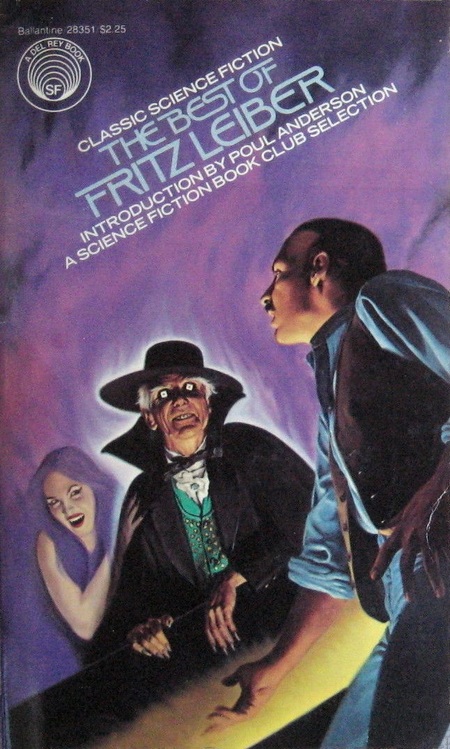
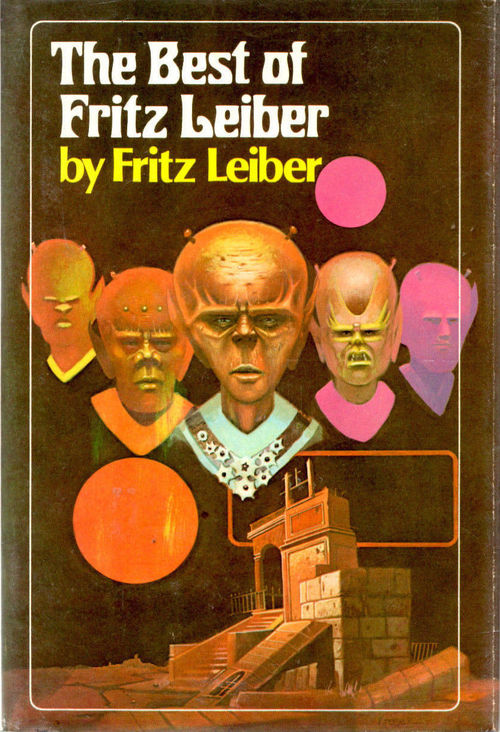
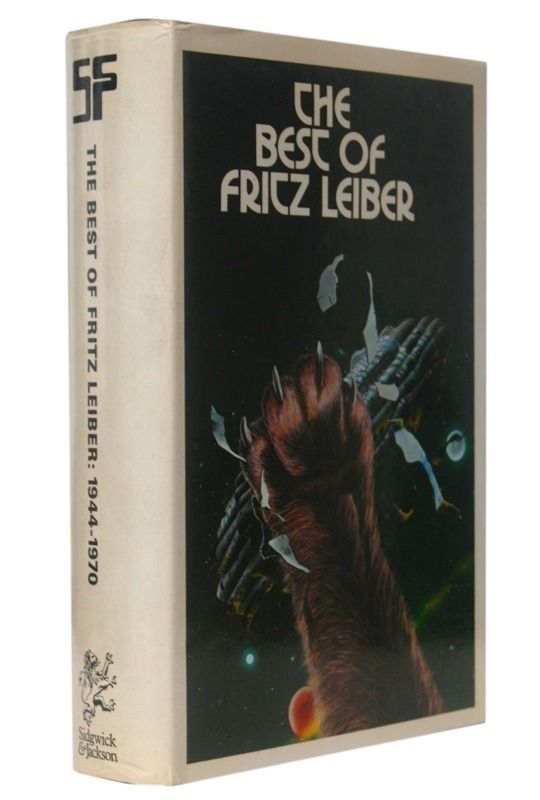
Truly on the greats. Conjure Wife and Our Lady of Darkness are two of the greatest horror novels ever, and while The Big Time hasn’t aged well (in my opinion), The Wanderer is dynamite – a wide screen SF wold shaking disaster novel with a cast of thousands, long before that sort of book became dominant, but also a satire (sorry, James) of the excesses of the form as it would come to be practiced. The Wanderer renders a half a dozen of Niven and Pournelle’s blockbusters completely unnecessary.
I agree with your assessments of Conjure Wife and Our Lady of Darkness. I think horror is probably best at the short story, and sometimes at the novella length. Thus I think it’s rare that a horror novel succeeds at being horrific, in my humble opinion. I do believe there are some outstanding exceptions though such as some of Stephen King’s earlier novels, Laird Barron’s The Conjuring, and Dan Simmon’s The Terror. But Leiber’s Conjure Wife and Our Lady of Darkness definitely succeed as horror novels!
Outside of this reviewed Leiber volume here, his horror, and his sword and sorcery, I haven’t really read too much of Leiber. Gather Darkness! has been sitting on my shelf for a few years now and he has some other intriguing titles that I’ve never read such as A Specter is Haunting Texas and The Big Time.
I’ve still got the ’79 edition of this, that was my first exposure to Leiber’s work after “The Big Time”. After this, I started tracking everything Leiber had written, and he remains my favorite author.
Indeed, satire does not age well, but I always thought the Hubbard reference in “Poor Superman” was pretty clear. But I read this in the ’80s, and we were besieged by Dianetics/Scientology peddlers back then.
Upon re-reading, I think I was probably a little harsh on satire, in toto. Context clearly makes satire clearer. From the 80s I still remember all of those volcano commercials trying to sell Dianetics. I can see why you clearly got it back then!
Love Frizt Leiber! I’ve loved everything I’ve ever picked up by him.